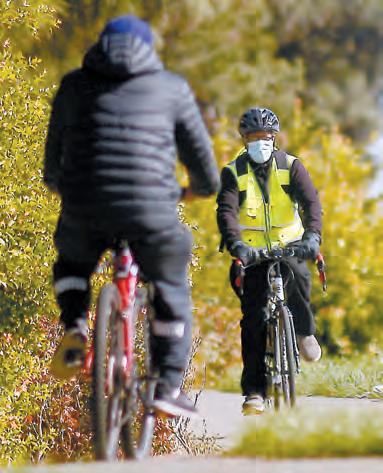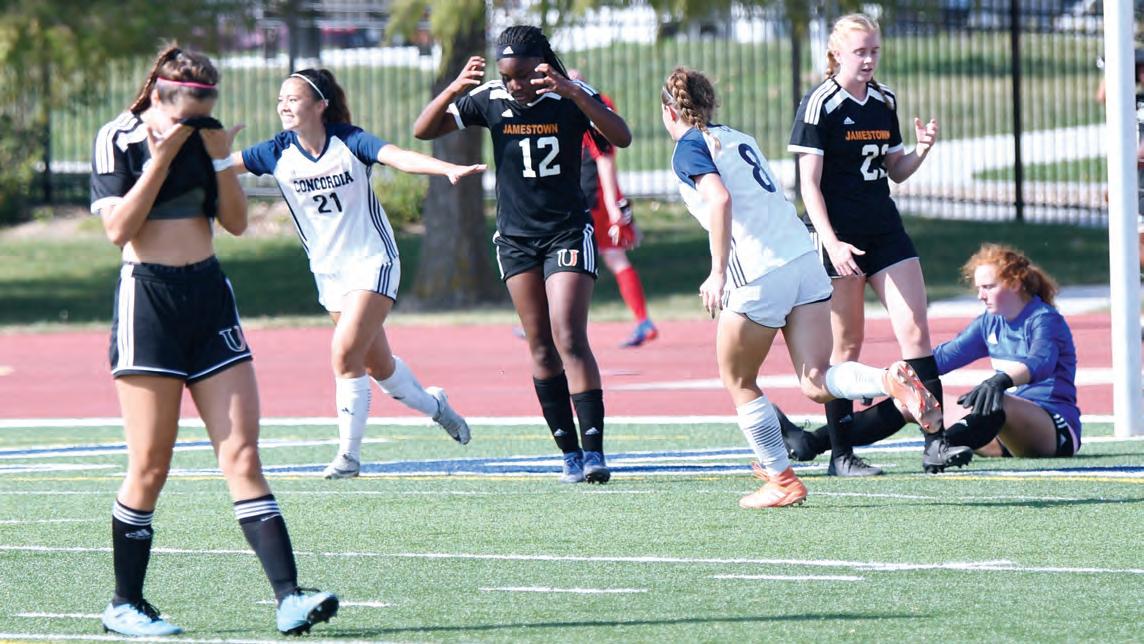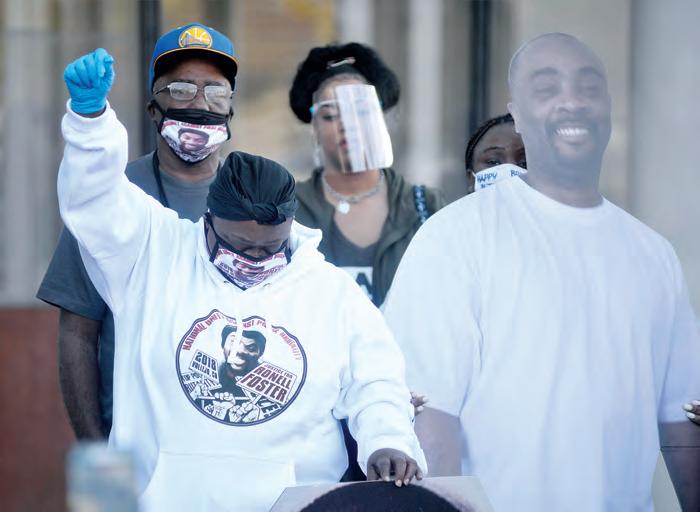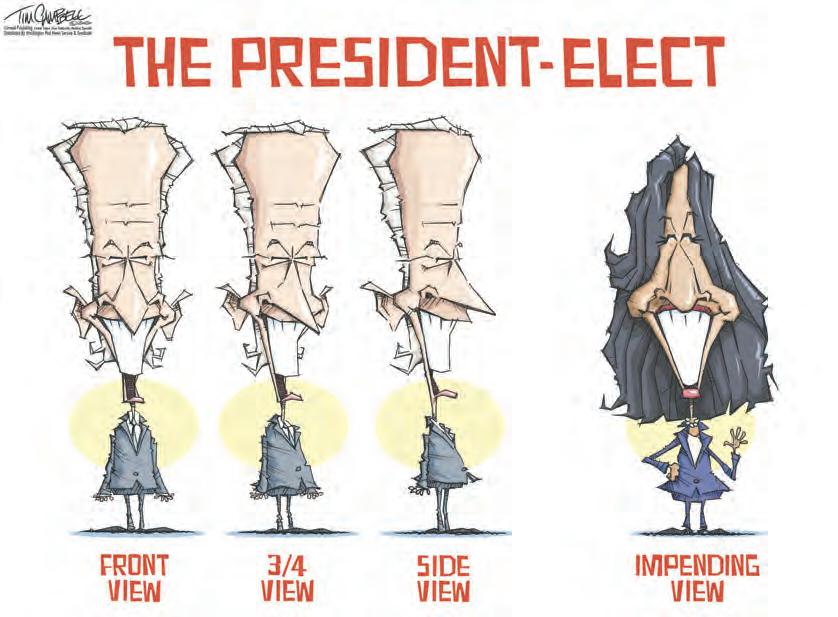Opinion
DAILY REPUBLIC — Friday, November 20, 2020 A5
the tax watchers
Kudos to Tyler Carrion, the republic
T
hanks to The Tax Watchers for sharing today’s column with Constitution Literacy Advocates. We recently concluded the ninth annual Constitution Essay Contest in Solano County. High school students were asked to choose the better method for electing a president of the United States: the Electoral College or the national popular vote. From the 96 entries this year, Tyler Carrion, an 11th-grader from St. PatrickSt. Vincent High School, was awarded the grand prize, a Colleen Britton $700 mini-grant. It is gratifying to see young people grasp the value of our constitutional institutions. His winning essay is below. Defending the Electoral College Tyler Carrion Our Founding Fathers, framers of the Constitution, created the Electoral College in 1788 as a way of electing the president of the United States. It currently has 538 electors. Each of the 50 states is allowed one elector for each representative and senator. Washington, D.C., our nation’s capital, is allowed three electors. On Election Day, voters choosing a president are actually casting a vote for electors, whose job in turn is to cast votes based on their states’ popular vote. A candidate requires at least 270 Electoral College votes to win. Debate and criticism surround the effectiveness of this system. Some argue the Electoral College is antiquated and should be replaced by a national popular vote. I believe it is still relevant today and should remain intact. The Electoral College was put in the Constitution because our Founding Fathers believed it was the best mechanism to select the president. They thought by using electors, it would protect against uneducated or misinformed voters. The final decision is placed in the hands of individuals who were considered more educated and likely to make the best decision. This method likely prevented large states from excessive influence and tyranny on the minorities by the majority. An Electoral College would give fair representation, allowing a majority vote without overpowering smaller states, thus creating a “democratic republic.” Without this, we would have a majority-rule country controlled by largely populated states such as California and Texas. Smaller states would never be heard and overlooked, forcing them to secede from the United States to form their own new country within a country. The Electoral College guarantees the entire country is involved in choosing the president. Having a national popular vote system would change the way candidates campaign. If an election depended on popular vote, the candidate could limit campaigning to specific highly populated areas, bypassing smaller states like Wyoming and Montana. In an Electoral College system, candidates must address the needs of the entire country to gain electoral votes. Candidates must appeal to a wider range of voters. The needs of small towns/rural areas are not ignored in favor of densely populated metropolitan areas. However, smaller states are still not truly equal to larger states. Putting this into perspective, California has a population of around 40 million people while Wyoming has around 500,000, resulting in an 80:1 ratio. This allows California to dominate in representation while Wyoming votes mean almost nothing. In contrast, Electoral College odds are much improved with a ratio of 18:1 – still a smaller voice for small states, but definitely a fairer outcome for all. The Electoral College was purposely designed to protect the nation from dangers inherent in a democracy. It is not a useless, outdated institution, but rather a mechanism for liberty, stability and legitimacy, helping to preserve our Constitution. It symbolizes we are a “federal republic,” a country governed by elected representatives and an elected leader. For these reasons, it should never be replaced. Colleen Britton is a member of the Central Solano Citizen Taxpayers Group.
DAILY REPUBLIC A McNaughton Newspaper Locally Owned and Operated Serving Solano County since 1855
Foy McNaughton President / CEO / Publisher
T. Burt McNaughton Co-Publisher
Glen Faison Managing Editor
This week’s question: When should President Trump concede to former VP Biden? Go to www.daily republic.com/ pulsepoll to vote.
commentary
Pennsylvania under Election Day cloud
I
that mostly favor Democrats, had hoped, as dawn broke Nov. 3, that the euphoit is an understatement to say ria of record-breakthat all did not feel well on this ing voter participation bright and sunny Election Day would wash over Pennsylin battleground Pennsylvania. vania with such force as to “If we had civil unrest with scrub away the ugly, undemPresident Trump . . .” said ocratic and unsettling real51-year-old short-haul trucker ities of life as it has become Dan Edwards, cutting himself in our incendiary time. as he waited to vote at Penn Maria Panaritis off But Election Day, instead, Township Municipal Building. felt like a roller coaster ride of whip“If Biden gets in,” he said, pausing again. “It’s a good thing they’re lash and worry. calling in the National Guard because For six dizzying hours that day, there will be some very unhappy I sought to size up early signs of the people. Things are gonna explode.” most fraught presidential contest in “I’m not gonna be one of the ones living memory. I started out in Philarioting,” he continued. The gun delphia’s blue-for-Biden suburbs and owners, Edwards said, will be the ones made my way 90 minutes west into who rise up. “I just see the writing on deep-red-for-Trump Amish country. the wall. It’s gonna explode.” When the ride ended, I felt sick Standing nervously in that same to my stomach. line, 28-year-old social worker Rachel In the suburbs where Democrats Nauman described a sense of unease. were hoping to surge Joe Biden to “Manheim is a super conservative, victory with massive turnout unseen close-minded town,” she said. The in the Clinton-Trump race of 2016, registered Democrat seemed uncomI heard about liberals marching their empty mail-in ballots to local fortable “to be voting the way I’m polling sites in Delaware and Montvoting, surrounding by people who are gomery counties. not like-minded.” Would-be absentee voters no The line at this polling place was longer wanted to use Pennsylvawrapped around the building at nia’s expanded mail-in ballot law. 3 p.m. – and had been long since the They were concerned about President start of the day. Even Amish men Donald Trump and his Republican and women stood patiently in straw Party’s candid plans to attack the hats and bonnets, some of whom were counting of mail-in votes in this batvoting for the first time. tleground state so they ditched their This was a Trump crowd through empty ballots at the polls to instead and through. And in a county whose vote in person. hundreds of thousands of conservative What I later found in durably long Republican voters are considered a voter lines in heavily Republican prize in any presidential election. Lancaster County was a disturb“Our first time out,” said a 50-yearold Amish man who refused to share ing version of the gospel according to his name but who was the only one Trump. Two of the first men I spoke to speak as I asked him and his two with in a voting line in Manheim Amish female companions the same warned that gun-owning Trump diequestions. “Our friends and neighbors hards would unleash violence if the just persuaded us.” president failed to win re-election for I came to Lancaster because of whatever reason. efforts on the ground by RepubliWe are a state and a nation at war among ourselves. cans to grow their share of voters With no clear sense of how the vote there, in part by recruiting Amish count would proceed amid the novel voters to help offset expected Democoronavirus pandemic and legal chal- cratic turnout gains across the state. lenges over mail-in ballot tabulations Since 2016, Republicans added about
20,000 registered voters in Lancaster County to 7,000 by the Democrats. Republicans outnumber Democrats in Lancaster County 3-to-1, at roughly 354,000 to 115,000. For the same reason, but from a polar opposite ideological perspective, I also took a spin through heavily Democratic Delaware County. Turnout early in the day across the former GOP stronghold appeared encouraging for liberals. But optimism was tamped down by fear of massive voter disenfranchisement: Just how many Democrats who tried to vote by mail had been harmed by machinations at the Trump-controlled U.S. Postal Service? How many who had managed to vote remotely would find their ballots tied up in a GOP legal blitz leaving a share of the absentee vote uncounted? “Someone was showing me pictures yesterday of disassembled sorting machines at Lindbergh Boulevard,” said U.S. Rep. Mary Gay Scanlon (D-Pa.) of a major Postal Service distribution hub in Philadelphia. She mentioned this as she and I talked outside a polling site at Marple-Newtown High School in Newtown Square. Scanlon’s office also was investigating complaints of ballots not being delivered in bulk, her spokeswoman later told me. Standing with me and Scanlon was Democratic state House candidate Deb Ciamacca, a former Marine and retired 62-year-old high school social studies teacher looking to oust Republican incumbent Christopher Quinn. Ciamacca told us something she had heard from a voter at a different polling place earlier in the day. “Somebody told me I should be in jail,” Ciamacca said. Ugly, undemocratic, unsettling. No matter the outcome in Pennsylvania, good luck erasing the dangerous divide laid bare on this historic day. Maria Panaritis is a columnist for The Philadelphia Inquirer.
calmatters commentary
French Laundry flap spotlights insiders
T
wenty-two years ago, on Napa restaurant, and Newsom the day after Gray Davis and his wife, Jennifer, attended was elected governor even though it was the sort of of California, I hopped gathering that Newsom had often discouraged to battle the aboard a Southwest Airlines Covid-19 pandemic. plane bound for Los Angeles. I was heading south for When the San Francisco Chronicle reported on the Davis’ morning-after press Newsoms’ attendance, its bad conference and I was not optics forced the govalone. Several journalists and Dan Walters political other Capitol figures were on ernor to apologize profusely, the plane, including the man saying Monday, “I shouldn’t sitting across the aisle, a lobbyist for have been there, I should have turned public employee unions. back around. And so when that The lobbyist was in an ebullient happens, you gotta pay the price, but mood as we chatted. His union clients you also gotta own the mistake and had helped Davis weather a very you don’t ever make it again.” rough patch in his 1998 campaign for The French Laundry incigovernor, when he faced two multident, which reverberated loudly on social media as an example of politmillionaire rivals in the Democratic ical hypocrisy, also put the spotlight primary and needed all the money on Kinney – a former speechwriter he could get. The lobbyist was literally rubbing for Gray Davis, incidentally – and his hands gleefully, expecting that his his instantaneously lucrative lobtight relationship with Davis would bying practice. automatically bring him a cornucoAs Politico pointed out in aquickly reported and written article, pia of new clients and their fees. And “Axiom reaped $10.9 million worth of he was not wrong about that, as later became evident. lobbying work in 2019-20, the first legI cite this instance because of the islative session during which Newsom flap over Gov. Gavin Newsom’s attenwas governor.” The firm hasnine lobbyists and dance at a birthday party this month more than 80 clients, most of whom for lobbyist Jason Kinney, a veteran are corporate entities or coalitions political consultant and a longtime who in Capitol politics would be joustNewsom friend who founded a lobbying firm, Axiom Advisors, shortly ing with interests, such as unions and after Newsom was elected in 2018. environmental groups, associated with Kinney’s 50th birthday was celeNewsom’s Democratic Party. “Some of Axiom’s clients highlight brated with a lavish dinner party at Kinney’s overlapping roles. Kidney French Laundry, a very expensive
dialysis firms DaVita and Fresenius paid Axiom $475,000 this session,” Politico reported. “During the same period, Kinney earned $90,000 from the California Democratic Party, which spent money to pass a laborbacked initiative regulating kidney dialysis. DaVita and Fresenius were the measure’s principal opponents. “The single most remunerative client for Axiom in the last two years has been Marathon Petroleum, giving Kinney’s firm $525,000 worth of business. Marathon is a member of a powerful oil industry organization that battled proposals to ban hydraulic fracturing; Newsom called on the Legislature earlier this year to send him a fracking ban.” Political decisions can have immense financial consequences and when conflicts arise, it’s prudent to have someone on retainer with a seat at the table in the back room where those decisions are made. The lobbyist with whom I chatted with 22 years ago still has a lobbying firm and dozens of clients who pay him more than $4 million a year. In real-world politics, one must pay to play with lobbying fees and campaign contributions. Rightly or wrongly, it is what it is. CALmattersis a public interest journalism venture committed to explaining how California’s state Capitol works and why it matters. For more columns by Dan Walters, go tocalmatters.org/commentary.







